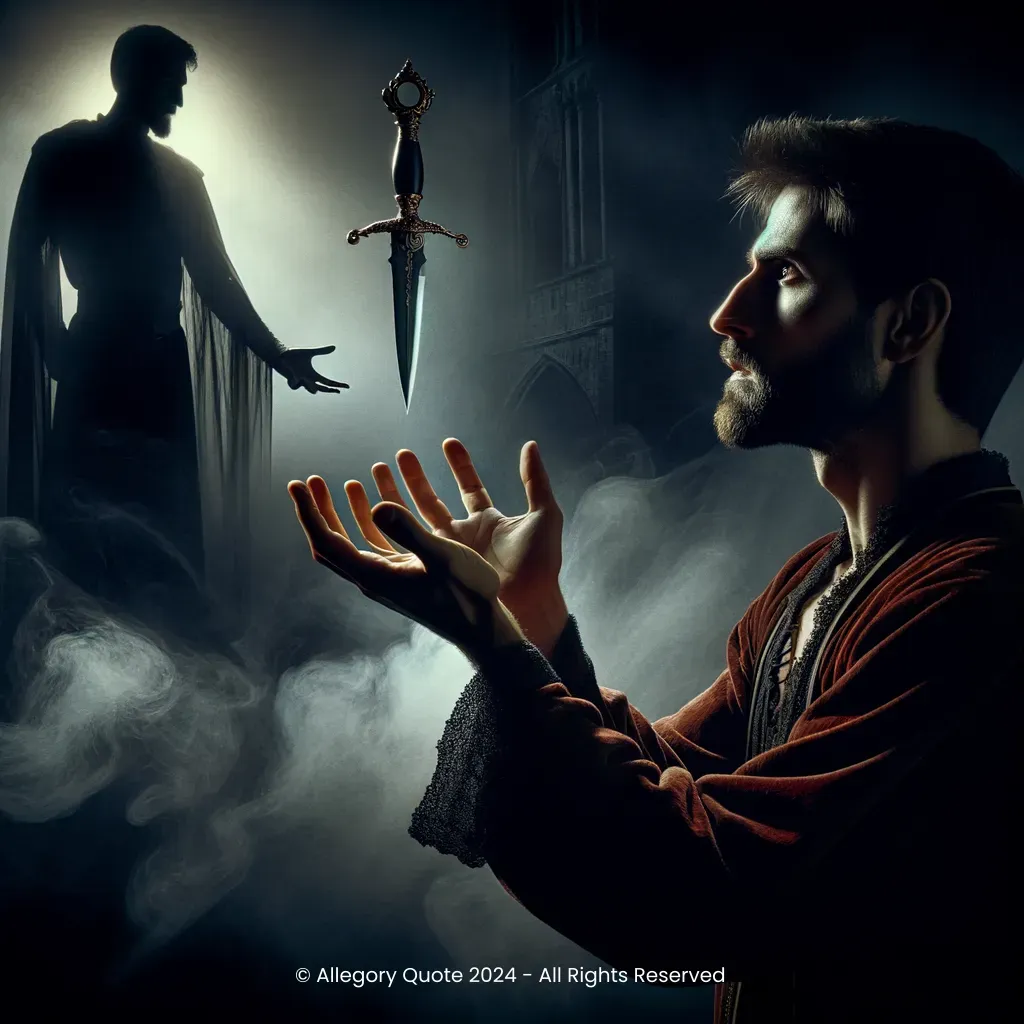”Is this a dagger which I see before me,
the handle toward my hand?“

0
0
0
0
- Meaning
- The phrase "Is this a dagger which I see before me, the handle toward my hand?" captures a moment of intense psychological conflict in Macbeth. It symbolizes his ambition, guilt, and descent into madness. The dagger he sees is a hallucination, representing his murderous intentions and the moral consequences he faces. This line delves into themes of fate versus free will, the corrupting power of unchecked ambition, and the psychological turmoil that accompanies the commission of evil acts. In essence, it's a profound commentary on the battle between one's aspirations and ethical considerations.
- Allegory
- In the image, the ethereal dagger signifies Macbeth's ambition and the murderous intent driving him towards regicide. The dark and foggy atmosphere creates a feeling of foreboding and enhances the tension of the moment. Macbeth’s troubled expression and hesitant reach convey his inner struggle and moral conflict. The shadows of his inner demons represent the guilt and madness consuming him. The sinister glow of the dagger highlights its allure and danger, while the dark, shadowed castle in the background alludes to the impending crime and its grave implications. This visual allegory encapsulates the complexity of Macbeth's psychological turmoil at this crucial juncture.
- Applicability
- This famous quote can be applied to personal life when dealing with making tough ethical decisions, especially where ambition is involved. It serves as a metaphor for questioning one's intentions and contemplating the moral consequences of one's actions. It reminds us to consider whether we are being led by our aspirations or by something more sinister, and to confront our inner conflicts directly.
- Impact
- This phrase has had a substantial impact on culture and society. It is one of the most quoted lines in literature, often used to illustrate moments of decision-making and moral dilemma. The imagery of the dagger has been widely referenced in various adaptations of "Macbeth" across theater, film, and literature, influencing countless works and discussions about ambition and ethics. It remains emblematic of this profound inner conflict.
- Historical Context
- The phrase originates from the play "Macbeth," written in 1606 during the reign of King James I. The historical context of Shakespeare's writing includes the Elizabethan and Jacobean eras, known for their rich artistic expressions and exploration of human nature in literature. The themes in "Macbeth" resonated with contemporary audiences, who were familiar with issues of power, betrayal, and the psychological effects of guilt.
- Criticisms
- There have been discussions about the interpretation of Macbeth’s vision. Some believe it shows his decisive madness, others argue it’s a manifestation of his unchecked ambition. Critics also debate whether the dagger is purely symbolic or if it signifies supernatural elements. The phrase's ambiguity leaves it open to various interpretations and enriches its complexity.
- Variations
- Variations of this phrase often appear in different cultural contexts, where the hallucination could be any object representing moral conflict or intense decision-making. In some Eastern philosophies, the metaphor might be depicted as a path rather than an object, embodying the journey and the choices one must confront.
-

The golden age is before us, not behind us.
-

If you prick us, do we not bleed?
-

Give me my robe, put on my crown; I have immortal longings in me.
-

The better part of valor is discretion.
-

The robbed that smiles, steals something from the thief.
-

Get thee to a nunnery.
-

What's done cannot be undone.
-

Love looks not with the eyes, but with the mind; and therefore is winged Cupid painted blind.
-

Something is rotten in the state of Denmark.
-

I am one who loved not wisely but too well.
-

Double, double toil and trouble; fire burn and cauldron bubble.
No Comments